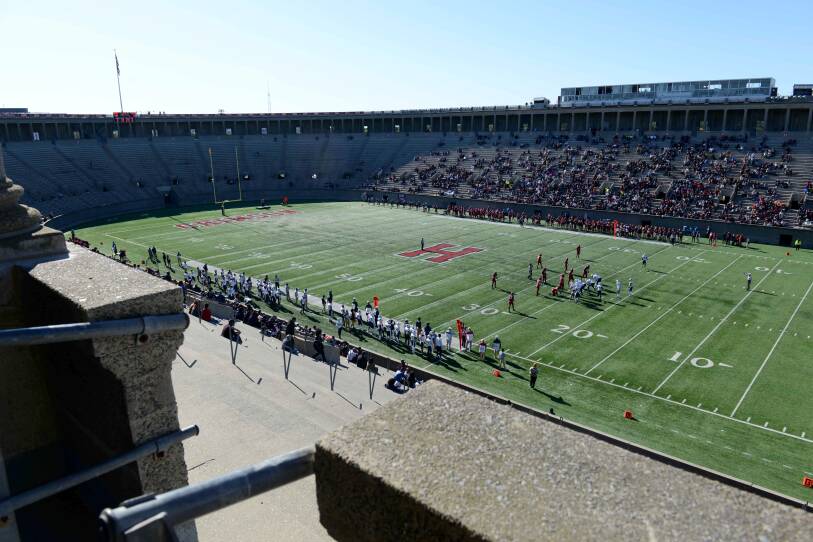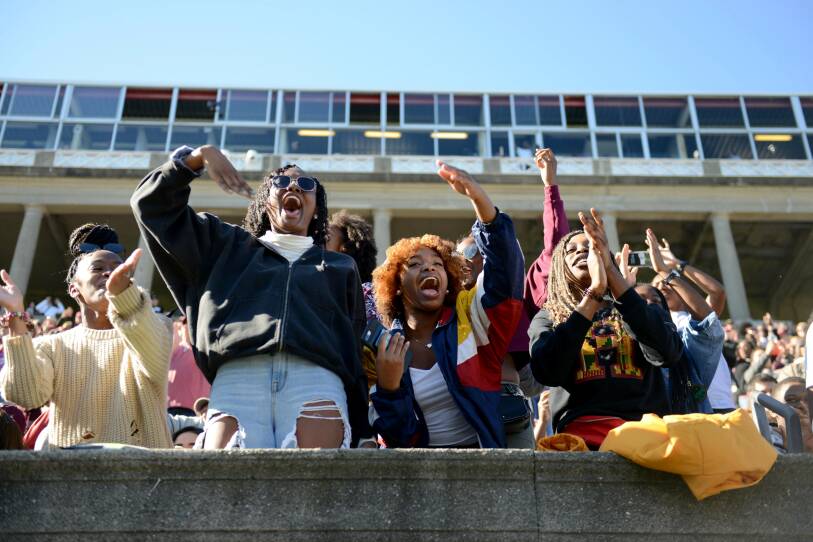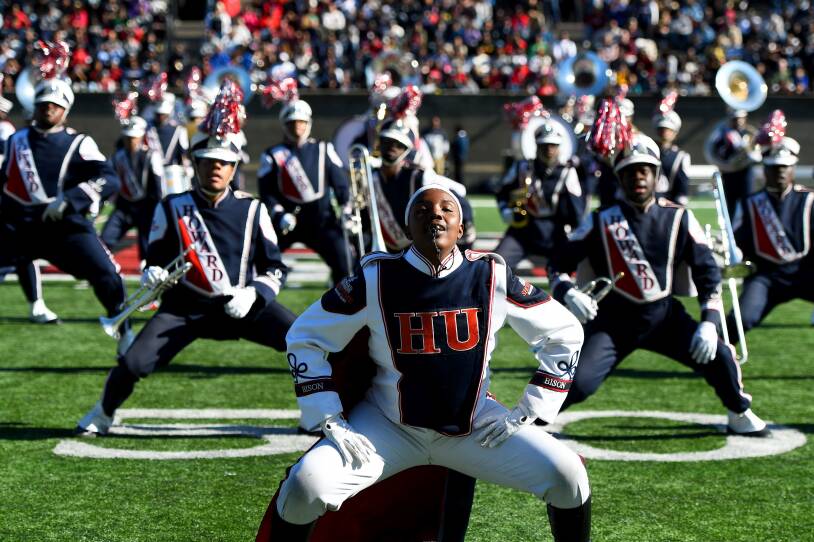When it comes to Harvard football, it's hard to be the first to do something. The school first fielded a team way back in 1873, less than a decade after the end of the Civil War. Over the course of those 146 years, the Crimson have played everyone from Yale University to the University of Texas.
But none of Harvard's opponents had ever been an historically black college and university, or HBCU, until last Saturday, when the Howard University Bison came up from D.C. to meet Harvard on the gridiron.
Both schools said they hoped the historic game and the public attention it attracted would help them recruit students. By playing Harvard, Howard also hoped to burnish its academic reputation.
"When I hired Athletic Director Kery Davis, one of my first conversations with him is that while we may not be able to play the Ivy League as a conference, we need to be playing the Ivy League schools," Howard President Wayne Frederick told WGBH News before the game.
Howard is known to some as the "Harvard of the HBCUs." Frederick said getting the world to see the Bison on the same fields and courts as Ivy League opponents elevates Howard's status.
Davis, Howard's athletic director, said one of the scheduling strategies was to play universities with like-minded academic standards.
"I think it's important that this is more than a football game for us," he said. "It's an opportunity to talk about and showcase the academic prowess of this university."

The two schools have been playing each other in men's basketball for several years now. Tim Murphy, Harvard's head coach, said discussions about playing football started about four or five years ago.
For Harvard, it checked off a lot of boxes: the chance to play an academically like-minded school from the D.C. area, which happens to be a good recruiting ground for Harvard.
But Murphy is also aware of the role HBCUs have played in the history of American education. "As a historically black college, I think it adds a lot of significance to our football team," he said.
For Howard, the game allowed the school to connect with its alumni, many of whom went on to attend Harvard.
But it also helped the school showcase itself. At a pre-game breakfast, Harvard pitched its post-grad programs to Howard students, and Howard talked to high school students from Greater Boston. The Harvard Student Association also hosted 50 Howard students on campus.
"It's gonna mean a lot in terms of the types of students that we can attract, and it will be consistent with the types of students that we're attracting now," Frederick predicted.

More than anything, though, the game offered an introduction to a culture that may have never been seen before along the banks of the Charles River.
At a pre-game tailgate hosted by Howard athletics, Howard's Department of Alumni Relations, and Harvard's Black Graduate Student Alliance, there were Harvard fans dressed in crimson mixed with Howard faithful in blue and red. Some even wore their Greek letters.
Tauheedah Baker-Jones, a doctoral student at Harvard and a leader for the Black Graduate Student Alliance, spent her first two years of undergraduate study at Howard. There she met her husband, and her daughter is currently a freshman at the school. Baker-Jones wore a blue sweatshirt with a Harvard "H" to show her split loyalties, but admitted that she comes from a Bison family.
When the contest was announced last year, the buzz was immediate. Over 500 pre-sale tickets for the tailgate were sold. Baker-Jones said that's more than any other Harvard tailgate before.
“HBCUs are heavily represented at Harvard at the graduate level, and so immediately people just were excited, whether you went to Howard or not," she said. "Just the idea of Harvard playing an HBCU was just a really big thing within the graduate community.”
But it wasn’t just the Harvard and Howard communities. People from other HBCUs and Ivies, including Hampton University, Morehouse College, and Yale University, came for what Baker-Jones called a Black Ivy Homecoming.
“This is just a celebration of black excellence at all Ivies and at HBCUs,” Baker-Jones said.
Tracie Jones, the administrative adviser to Harvard's Black Graduate Student Alliance, said the game and its festivities were something for the whole community.
"Unless you're in higher education, you really don't understand the significance of HBCUs," she said. "So this is just a way for other people to learn, just by being in this space."
As for the game, it was close through one quarter, but then the Crimson forced some key mistakes and never looked back, finishing with a 62-17 win.
Harvard defensive lineman Truman Jones, who said his parents and grandparents graduated from HBCUs, relished the chance to play in the game.
"I really come from an HBCU family," Jones said. "If I wasn't here, I probably would be at an HBCU."

Although Harvard won the game, Howard won the intermission when its Showtime Marching Band gave a halftime show unlike any Harvard Stadium has seen in its 116 years.
The story goes that when Howard started its football program back in 1893, Harvard gifted the team uniforms — one "HU" helping another.
Since then, the two schools have had different athletic fortunes, as have most HBCU’s when compared to traditional powers.
But contests like this on a big stage, Howard President Wayne Frederick says, are important in helping Howard catch up and raise revenue.
“There’s no doubt that ... we are significantly behind, and to close that gap, part of it is that we have to continue to get more competitive on the field as we move forward. … Games like this are going to help,” he said.
When Howard plays its traditional rival, Hampton University, it’s called “The Battle of the Real HU.” But with the Bison and Crimson scheduled to meet again in 2022 and 2023 on the football field, there may be another HU to add to the mix.
Correction: This article has been updated to more accurately reflect the location of the game and tailgate.





